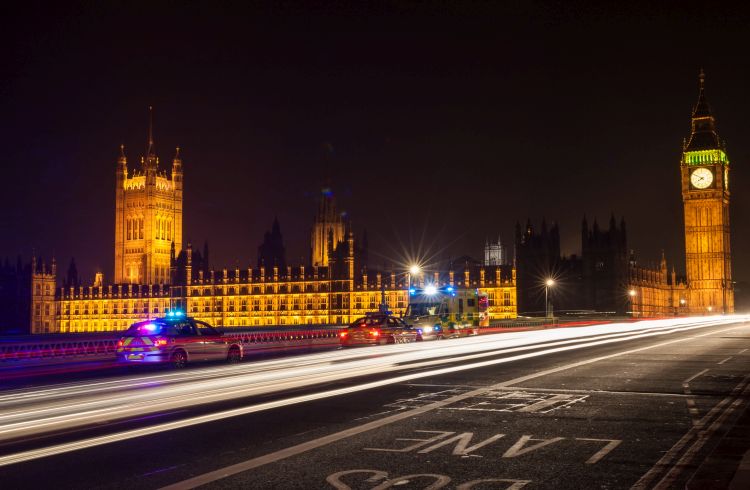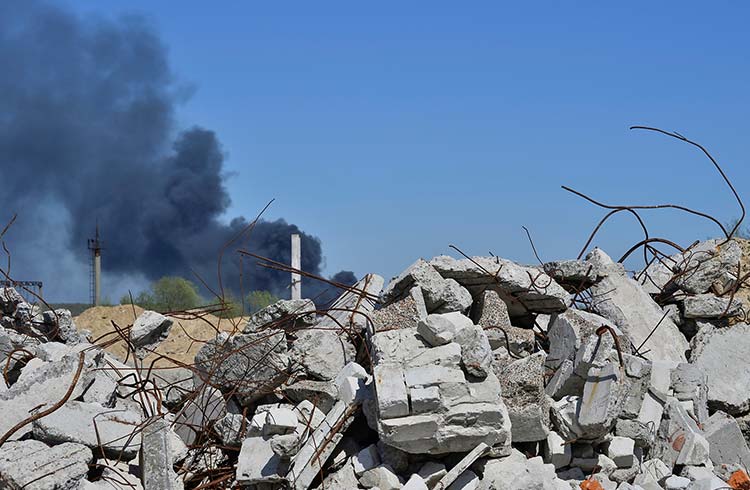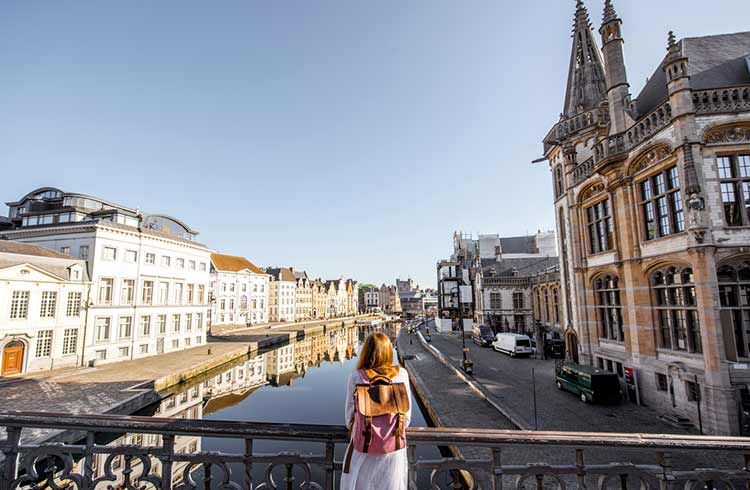Why I Choose to Travel Despite the Threat of Terrorism
It’s the question we ask ourselves every time there’s news of another terror-related incident: should I go, or should I stay? Johanna Read tells us why she chooses to keep traveling.
 Photo © Getty Images/dmbaker
Photo © Getty Images/dmbaker
I’ve faced the decision to cancel my travel plans following a terrorist attack three times: to New York City two weeks after 9/11, to Paris three weeks after the Charlie Hebdo attack, and to Tunis a month after the attack on the Bardo Museum.
Each time I went on the trip as planned. Among my rewards were welcoming locals, good prices, a lack of crowds, and the comforting feeling that I was helping local people and not letting the terrorists win.
- To travel or not?
- Why I travel despite terrorism
- The risk of terrorism
- Putting things into perspective
- How to respond to terrorism
Travel and terrorism: When is it safe to go?
After news of the attacks, I checked news reports to assess three critical questions for myself. Two are easy yes or no questions, the third is more nuanced:
- Is the infrastructure in place so that my arrival as a tourist will not be a burden? (This is more important after a natural disaster when limited resources should be reserved for local people and rescuers, but could be applicable after a terrorist attack too)
- Is the government responding appropriately and do they have the means to put in place reasonable security measures?
- Who is claiming responsibility for the attack and for what reasons?
If the attack is by an internal group against the country’s government, I might consider changing my plans. For example if Eta, the Basque separatist group, resurrected its attacks against the Spanish government, I would think twice about traveling to Spain, particularly near an election.
But if the attack is by Al Qaeda or ISIL/ISIS seeking to monger fear and cause chaos? As long as the answers to the first two questions are yes, I’ve always decided to travel.
Why I travel despite terrorism
Attacks by extremist groups like Al Qaeda are random and impossible to predict. It is also unlikely for an attack to happen in the same place twice (yes, there were repeat attacks in Paris and Tunisia, but in different areas).
In most cases, one of the safest places in the world is a city that has recently had a terrorist attack. Everyone - officials and citizens - is hyper-vigilant. No suspicious package or unattended backpack is left unnoticed. No one is allowed into an important tourist site without their camera x-rayed, their water bottle examined, and their person metal-detected.
Whenever I visit a major destination that could be the target of attack, I do three things slightly differently than I do at home in Canada or when visiting smaller cities:
- I avoid big crowds and especially demonstrations.
- I try to avoid lingering near cars parked at major monuments (it's pretty easy to plant a car bomb).
- I go out of my way to share on social media that I feel safe and am enjoying my visit at the destination.
That’s about it. I base these actions on the goals of terrorism and the facts behind risk.
The risk of terrorism
Yes of course I want to avoid injury or death by terrorists. But just how real is that risk?
Plane crashes and terrorist attacks make front page news, we’re constantly reminded about them on social media, and we continue to talk about them weeks after an attack. This makes us think they are more prevalent and higher risk than they really are.
Your perceived control also affects whether you think you are susceptible to a given risk. And when large numbers of people are affected by something at the same time, we think there is more risk than there actually is.
For example, people are more worried about a vacation flight than about driving their own car to work. Why, when driving is much more dangerous than flying? When we fly, we relinquish control to a pilot. We think we are good drivers, and that car accidents happen to other people, not us. Plus, car accidents are rarely reported in the news, while plane crashes always are.
Tragedies happen everywhere. We are always at some level of risk. But I don’t want my actions - or the world’s - to be dictated by fear. I want decisions to be based on evidence.
The evidence says I’m much more likely to die or be injured at home than whilst traveling, and that my greatest travel risk is a mosquito-borne illness like dengue (though NOT Zika, which you can read about here). Statistics say that I am more likely to die from a TV falling on me than I am to die from a terrorist act. So I travel (and I stay clear of jumpy televisions).
Putting things into perspective
The U.S Department of State’s most recent statistics say that there were about 32,700 deaths from terrorism in 95 countries around the world in 2014. 78% of those deaths took place in just five countries -- Afghanistan, Iraq, Nigeria, Pakistan and Syria -- none of which are high on most tourists’ bucket lists at the moment. And a more accurate statistic is that 26,500 people died worldwide from terrorism in 2014, since about 6,200 of the 32,700 deaths were the perpetrators themselves, who committed suicide or were killed by security forces.
In comparison, the Association for Safe International Road Travel says that almost 1.3 million people die in traffic accidents worldwide annually -- that’s over 3287 people a day. Another 20 to 50 million are injured. Road accidents are the 9th leading cause of death in the world -- the only cause in the top 10 that is not a disease.
To compare just one country, the U.S. international affairs think tank, the Council on Foreign Relations, says that since 9/11 an average of 29 Americans die annually from terrorism attacks. 37,000 Americans die in car accidents annually, with 2.35 million more injured or disabled every year.
You’re much more likely to die from a car accident, choking on a hot dog, or a lightning strike than from terrorism. You have about the same odds for dying from a cow or an elevator.
How to respond to terrorism
A main purpose of terrorism is to cause fear and discord. By succumbing to that fear we are letting terrorists succeed in their mission to gain publicity and legitimacy, to cause hysteria, and to increase repression of human rights.
The best reaction to terrorism is to show that we will not let terrorism change our lives. Don’t help the terrorists get what they want.
Once you know you won’t be a burden to a recovering city, go. Add much needed dollars, francs, or dinars into the economy. Help create jobs. Help the people who live there make a living wage. Destinations hit by terrorism need your business. They even need your tweets and instagrams to encourage other people to travel there.
By being overly fearful we encourage businesses and governments to waste money on security measures (and wars) that are, if not useless, at least not risk-based. The U.S. spends $7 billion annually on the Transportation Security Administration. CNN reports that in a controlled undercover study in 2015 testing the TSA’s effectiveness, officers missed 95% of guns and explosives in dozens of American airports.
There would be significantly less terrorism if we instead invested in creating a world without disparity and where human rights are guaranteed. This would prevent extremism from developing in the first place. We need a world where desperate people don’t feel the need to form revolutionary groups, and a world without oppression so that the general population doesn’t see the need to sympathise, legitimise and fund the revolutionary groups.
Can you imagine how much better off the world would be if all the money spent globally to fight extremism and perceived threats since 9/11 had been spent on clean water, food, education, healthcare, job creation and helping countries transition to democracy?
Yes, you could cancel your travel plans after a terrorist attack, but you likely wouldn’t be any safer. And the world would get more unsafe if we stopped traveling - countries’ economies would suffer, disparity would rise, and we’d become less familiar with the differences - and the similarities - between all of us.
Related articles
Simple and flexible travel insurance
You can buy at home or while traveling, and claim online from anywhere in the world. With 150+ adventure activities covered and 24/7 emergency assistance.
Get a quote

14 Comments
I certainly agree with Johanna. I myself went to Paris a couple of weeks after the attacks last November. I had a wonderful time and felt very safe. Main attractions weren't over crowded and everyone was so welcoming. I also noticed that the article I wrote about Paris that Christmas was very popular. I think people were pleased to see a brighter side of Paris and to see her carry on regardless so to speak. And I was very glad of the opportunity to write about and share my photos.
Many thanks for saying so, Kathryn :-)
There are many benefits to travelling during tense times -- to the traveller, to the people who live in the city, and to the world. I'm glad you enjoyed your trip to Paris and that so many people benefited from your article showing them that it was still a great place to visit.
I loved Paris during my trip shortly after Charlie Hebdo (except for the cold snap in the city that made walking bitterly cold, even to this Canadian!)
thank you!
Johanna
Thank you for your article. I agree completely. You stated this all so well too.
Many thanks Wanders The World - much appreciated :-)
Johanna
This article came at the right time for me. A friend and I are going to Bangkok & Phuket in December (not that soon), but I just saw this news: http://www.bbc.com/news/world-asia-37046943
Seems that these are politically motivated attacks though, not terrorism. I'm definitely going ahead with travel plans, but curious about what you'd do in this situation - given what you said about attacks by internal groups?
Hi Isabelle
Yes, the latest news out of Thailand isn't good. But Thailand has these kind of incidents, protests that turn violent, and coup attempts somewhat frequently -- almost always politically motivated.
I would watch the news to see how the Thai government and police respond. In Turkey recently, for instance, I was shocked by the extreme reaction of the government to the coup attempt there and I think that it will just breed more discord. I would be surprised if the same happened in Thailand.
If I had a ticket to Thailand for December, I wouldn't be cancelling my plans (though I would consider going somewhere other than Phuket, but only because it is so touristy there! Check out Travelfish.org for great independent advice about what to see and do throughout Southeast Asia) :-)
Enjoy your trip -- I adore Thailand.
Johanna
As a traveler who visited almost every country in the world, I was reading your article fully agreeing with everything you wrote, until the last few paragraphs. Unfortunately, I don't agree with your conclusion that "There would be significantly less terrorism if we instead invested in creating a world without disparity and where human rights are guaranteed". In my personal opinion, and obviously you may disagree with it, 99% of global terrorism today is not fed by a "disparity" but rather by a religious indoctrination that "mine is a true religion, and anyone who disagrees with my beliefs must be killed". As a proof, many, if not most terrorists come from prominent families with no family history of deprivation or lack of human rights.
Otherwise, a great article!
Many thanks, Alex.
Wow - almost every country in the world, that's quite an achievement (I'm only at about 25%)!
I'm glad that you took the time to comment; differing opinions and healthy arguments are most welcome (especially when they're so courteous, how rare for the internet!)
Yes, my argument is a bit simplistic for this article, there are many more nuances. But one could argue that isolation, racism, lack of freedom of religion, and lack of democracy have contributed to the extremist religious views of a rich person, and contribute to some segments of society tolerating and even supporting his views. And a rich terrorist easily recruits poor, desperate people to both join his cause and be sympathetic to it.
We can never rid the world of violence, but we can reduce it greatly and I think true universal human rights would make a huge difference. We've thrown billions of dollars at fighting terrorism, and that isn't working.
Happy travels -- I'm curious which countries you haven't been to yet!
Johanna
I,too,like to go where there is a hint of danger,S Africa & Zimbabwe were a cakewalk compared to the border closing in Bosnia.Where International Law gets no respect,you will not find me. Acts of terrorism can happen anywhere,but certain hot spots have some appeal. The UAE will be next for me but I'll not follow up on my Tehran invitation.
Hi Rick
Yes, not going to places that ignore international law is a good rule!
I think you should reconsider Tehran, though. A photographer friend of mine went in 2015 and found it extremely welcoming and a wonderful place to visit.
Thanks for commenting and happy travels
Johanna
Thank you for this great article. It has reiterated thoughts I already have about my upcoming trip to Berlin.
Great article Johanna,
I've been to some countries that some people avoid as being "dangerous". All I found were extremely friendly people who really welcomed me, especially in places where I was the only tourist. On the other hand, I.moved to Madrid a couple of days after the 2004 bombing. Unfortunately, you can never know what can happen and where.I try not to tempt faith and avoid obviously countries at war and the ones around but otherwise I am always surprised as how much safer the world is compared to what I expected.Sometimes it's your biased view of a certain country that stops you from discovering a gorgeous place and a brilliant culture.
Your article is very helpful, thank you. You have managed to put my thoughts and (gut) feelings into words. I will be visiting Sr-Lanka in a few weeks and I am wondering what your thoughts are on the current situation there?
I am from South Africa and I know my country is labeled as 'dangerous' yet we have so many visitors each year.
Hi Johanna,
Thank you for the article!!! Many times it comes into our minds, well it is good enough to travel or not after the threat of terrorism takes place in certain areas. I'm from London, many time needs to travel for business purpose. But due to such terror issues, I'm getting lots of questions in mind. The three principals given by you are very much helpful to look forward to travel. Just Praying for all countries to get cured for all those things they have lost. As for know around the whole world, an overwhelming terror is going. Your article is really an appreciated one!!!